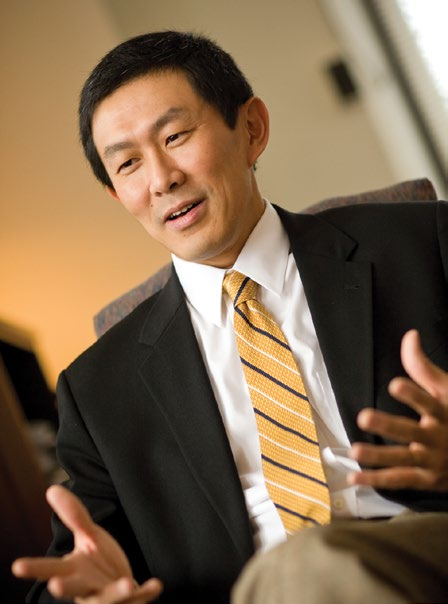This issue of the magazine celebrates one of the most important additions to Lehigh’s science and engineering landscape in recent years: the completion of the STEPS (Science, Technology, Environment, Policy and Society) building. The 135,000-square-foot building is part of a campus-wide initiative to strengthen Lehigh’s commitment to research and education in the related areas of energy and the environment. In addition to the physical facility, the $85-million STEPS initiative is funding endowed chairs, student fellowships, and technological improvements.
The core of Lehigh’s research and educational agenda is to generate new knowledge that meets the grand challenges of our time. Satisfying society’s need for energy while protecting the environment is a multifaceted test that will require unprecedented collaboration by scientists, engineers, policy and regulatory experts, social scientists and economists. Creating an environment that promotes cooperation is critical to meeting that challenge.
In the new STEPS building, researchers in environmentally related areas of political science, economics, education, history and journalism will work with scientists exploring alternative energy sources, groundwater decontamination, carbon-capture technologies, and smarter, leaner energy-consumption systems. Labs and offices have been designed and located to promote intellectual interaction. Casual gathering spaces have been strategically placed to make it easy for people to meet informally.
Lehigh’s faculty members are renowned for integrating research and teaching to provide opportunities for hands-on, inquiry-based student learning. STEPS reflects this. Nearly half the space in the new building is dedicated to teaching and research labs, and these are equipped with state-of-the-art instrumentation. This issue of Resolve also showcases the emergence of our Energy Systems Engineering Institute (ESEI), which has moved to the STEPS building. Energy usage accounts for much of society’s impact on the environment, thus the development of cleaner energy systems represents wise stewardship. But according to the U.S. Department of Energy, the labor force in America’s energy industry is aging, while the number of young engineers prepared to fill their ranks is dwindling. The ESEI’s innovative graduate program in energy systems engineering has attracted much support from industry. The innovative program recently graduated its first class, and all 22 M.Eng. recipients have found jobs.
In this issue, we also highlight new technologies that are being developed by Lehigh’s environmental engineers. Scrap iron, for example, is pretreating industrial wastewater in a historic pilot test in China. Smaller, cheaper biosand water filtration systems promise to make life easier for people who rely on the systems to remove contaminants from rain and surface water. With the addition of STEPS, we expect to see Lehigh’s impact in this important field grow.
I hope you enjoy this issue of Resolve. Please drop me a note to share your thoughts and comments.
S. David Wu,
Dean and Iacocca Professor P.C. Rossin College of Engineering and Applied Science

